
25 Best Queer Shows of the Century
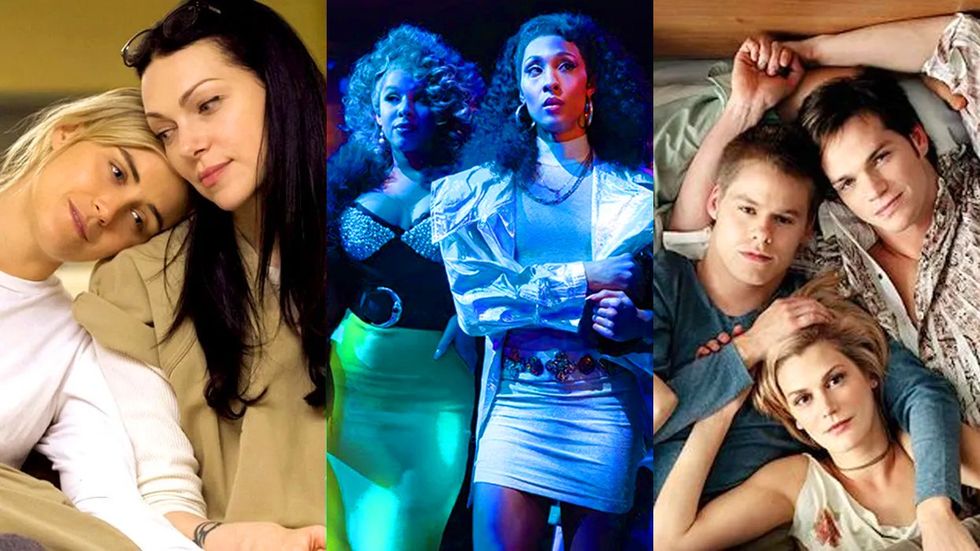
Queer characters on the screen began to flourish in the ’90s with New Queer Cinema. LGBTQ+ characters had break-though moments on shows like Roseanne, L.A. Law, and Friends (with TV’s first lesbian wedding). The watershed moment for TV came in 1997 when Ellen DeGeneres and her character on Ellen came out simultaneously, making her the first leading-out character played by an out performer. The following year, Will & Grace hit screens with the gay leading characters played by Eric McCormack and Sean Hayes (who came out publicly in 2010).
At the turn of the millennium, series like Queer as Folk and The L Word depicted whole friend groups of queer people on our TV screens for the first time. As the first 25 years of the century marched on, shows like Orange Is the New Black included stories of LGBTQ+ people and their intersections. Laverne Cox made history as the first trans person nominated for an Emmy, and trans people became central to the storytelling in shows like Transparent and Pose. By the close of the century’s first quarter, LGBTQ+ characters were routinely played by queer actors and with nuance and complicated pasts in shows like Euphoria and Baby Reindeer.
The editors at Out, The Advocate, and PRIDE voted on the best series of the century so far with TV shows released from 2000 through 2024. Those votes were tabulated and averaged. The rankings from 25 to 1 are based on impact, artistry, being a first of something, and general entertainment value. We hope this list brings back memories of when you first saw these shows. Of course, any list is subjective, and we welcome your thoughts on the best of the past 25 years.
25. Sense8 (2015) tied with entry below
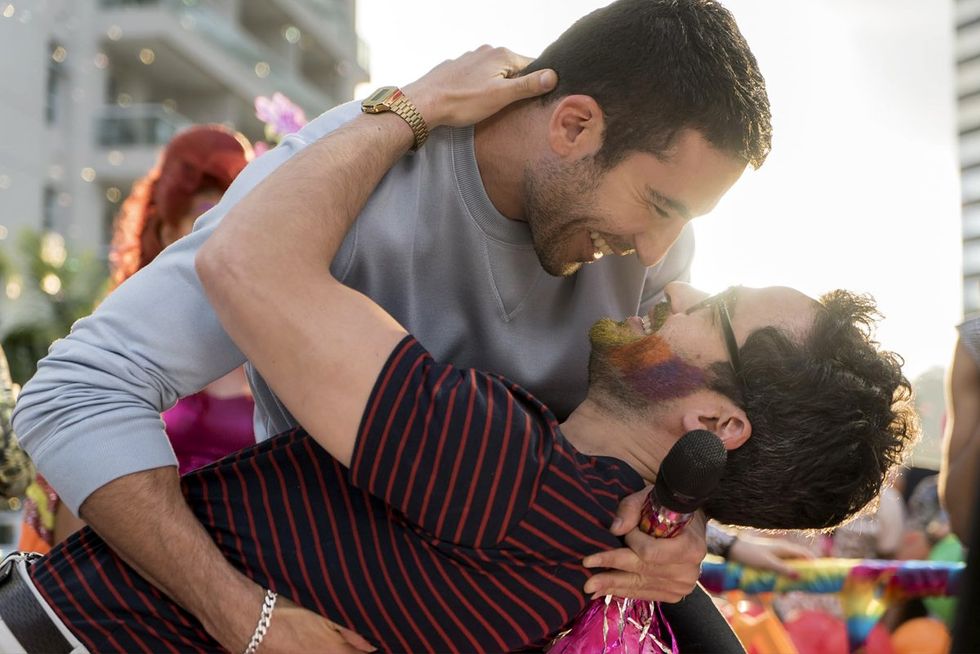
When Sense8 was canceled after just two revelatory seasons its fans were crushed, because never before or since has there been a show that speaks to the interconnectedness of humanity — across borders, gender, ethnicity, sexuality, you name it, lines — quite like this pseudo-super hero series from Lilly, Lana Wachowski, and J. Michael Straczynski. The series followed a group of strangers from across the globe who suddenly without reason or explanation become emotionally, psychologically, and famously, physically connected. These “sensates” could connect with one another and borrow each other's abilities, making them a formidable team. While the mystery and action were certainly compelling, that wasn't ultimately what made Sense8 so incredible — it was about characters, their dynamics, and what it communicated about a better vision of a world full of true uncompromised empathy. Specifically what that could mean in terms of a better future for queer and marginalized people. But also, let's be honest the show was also incredibly sexy and did not shy away from presenting queer sex. No wonder fans still dream of a reboot. — Rachel Shatto
25. Steven Universe (2013) tied with entry above

Oh, Steven Universe. The work of nonbinary creative Rebecca Sugar, Steven Universe featured deep examinations of gender, conversations about war and colonialism, discussions around consent, mental health struggles like PTSD, and Cartoon Network’s first same-gender kiss and the first same-gender wedding on a kid’s show. Sugar even wrote much of the lyrics and music for the show, which often included musical numbers in the later seasons. The show ran from 2013 to 2019 with an epilogue limited series that ran from 2019 until 2020. Based on Sugar’s actual brother, the main character, Steven, grows up in an atypical family, having to reckon with a parent he never met’s past. Steven shuns toxic masculinity, embraces femininity, and learns to be more and more empathetic. There are also aliens, spaceships, and amazing scenery art. Steven Universe is queer television at its finest. — Alex Cooper
24. Our Flag Means Death (2022)

Our Flag Means Death was gone much too soon! Canceled after just two seasons, this hilarious and heartfelt comedy starred Rhys Darby and Taika Waititi as real-life pirates Stede Bonnet and Blackbeard, but in this version, not only are they outrageously ridiculous, but they're also deeply in love with each other. Real pirates were gay as hell, and this show finally embraced that, showing us a crew of trans, gay, bisexual, and queer pirates forming a chosen family out on the open seas. — Mey Rude
23. It's a Sin (2020)
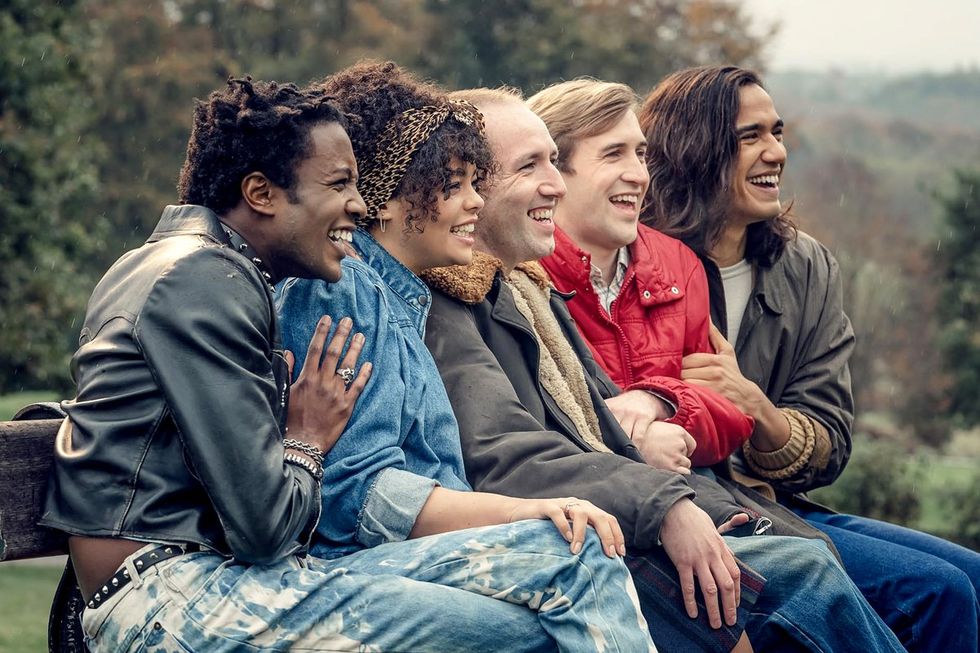
Queer as Folk creator Russell T. Davies shook viewers to the core with his five-part series It's a Sin, which premiered on Channel 4 in the United Kingdom and on Max in 2021. The affecting series turned back the clock to follow a group of queer friends in London beginning at the start of the AIDS epidemic. The confusion, fear, and misinformation of the time are front and center in a monologue from gay character Ritchie (Olly Alexander). He concludes he doesn't believe that AIDS exists after listing dozens of conspiracy theories about the illness befalling so many gay and bisexual men at the time. The series is based on Davies's experiences coming out in London in the '80s, and it captures the exhilaration of claiming one's identity only to be hit with a plague that was misunderstood and often came with a great deal of stigma. The series also emphasizes the critical reliance on queer friend groups and found family. It also starred Lydia West (Years and Years), Ash Mukherjee, Omari Douglas, and Callum Scott Howells. And it features Neil Patrick Harris, Stephen Fry, and Keeley Hawes (as Ritchie's mom).
22. I May Destroy You (2020)
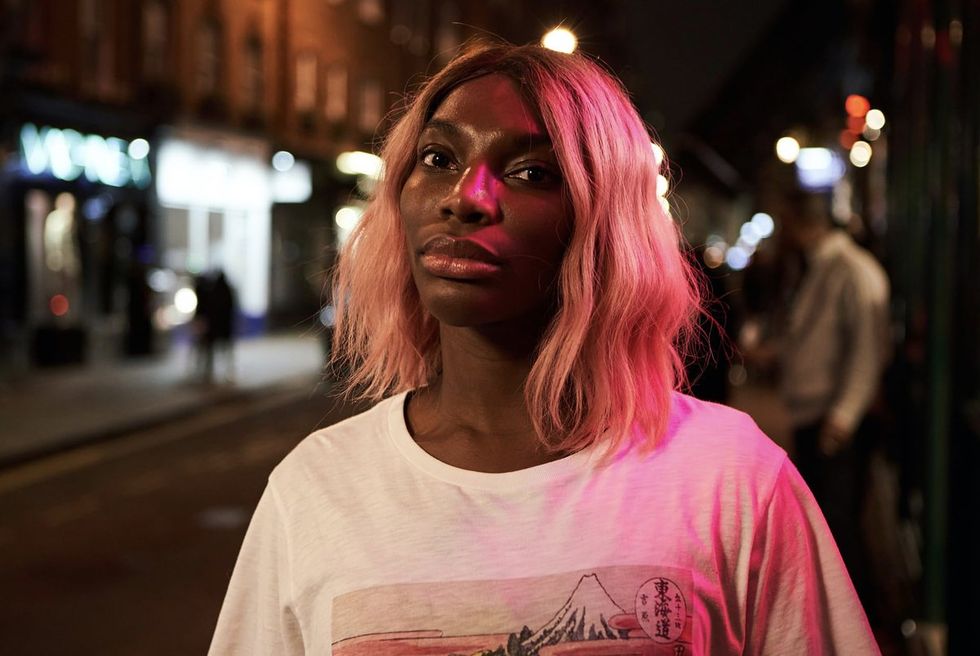
HBO's I May Destroy You delivered a gut-punch performance by creator Michaela Coel, who explores the impact of rape through her character Arabella. However, Arabella is not the only person grappling with the fallout of sexual assault. Everyone around her is impacted, including Kwame (Paapa Essiedu). As a Black gay man, Kwame goes through his own hurdles in processing his assault, including encountering homophobia at the hands of a police officer. His story is almost never seen in mainstream media, and it is artfully and heartbreakingly told in the hands of Coel. It's been five years since I May Destroy You aired and its themes are still unparalleled. — Daniel Reynolds
21. The Fosters (2013)
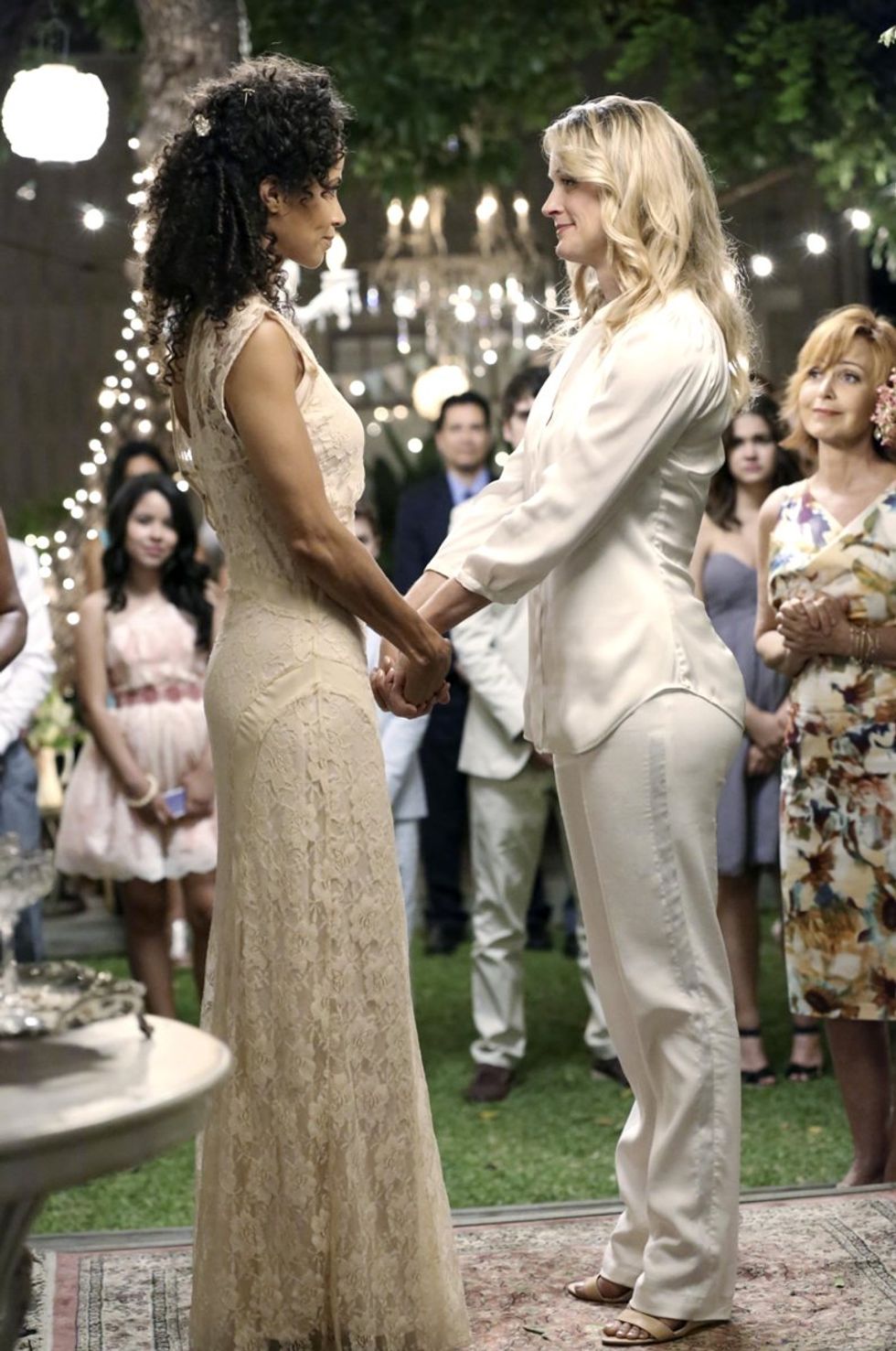
After five seasons and a three-hour finale, Freeform's The Fosters, the series from queer creators and showrunners Peter Paige, Bradley Bredeweg, and Joanna Johnson about lesbian moms raising biological, adopted, and foster kids, went down as one of the most consistently groundbreaking series in TV history.
The show explored the importance of marriage equality; tackled racism; featured one of TV's first transgender characters played by a trans man; and covered rape, school shootings, immigration and ICE, sex trafficking, breast cancer, and the multitude of issues kids in the foster system face daily. The Fosters ended its run in 2018, but the characters lived on for five more seasons in the spin-off, Good Trouble (2019), with Maia Mitchell and Cierra Ramirez reprising their characters as they navigate love, career, and social issues while living in a communal space in downtown Los Angeles. Good Trouble continued to move the needle forward for representation with both characters and cast members who span identities of pansexual, lesbian, bisexual, nonbinary, trans, and gay. Storylines for the spin-off tackled workplace sexual harassment, the police shooting of an unarmed black man, and body image issues. And like its parent show, it did it all with heart and humor. — Tracy E. Gilchrist
20. Heartstopper (2022)
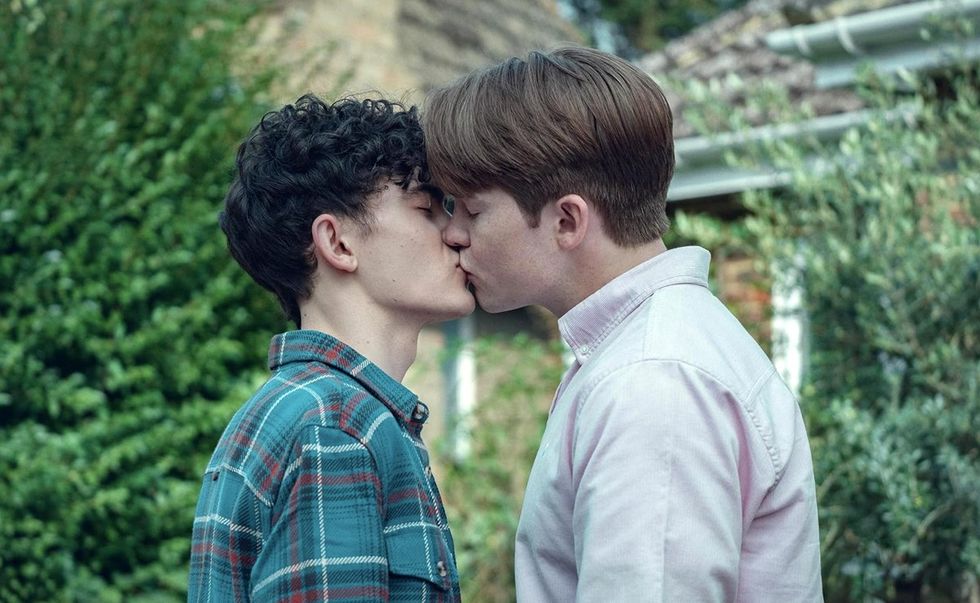
Netflix's Heartstopper features innocent characters going through very unrealistic storylines in terms of what it means to be queer and trans as a teenager in the 2020s. Those elements have drawn criticism, but are also big selling points. The series is a fairytale of queer youth navigating experiences that not that many queer people (if anyone at all) got to experience when they were in high school. It is for many a magical gift for queer people who need it.
Based on the graphic novels by Alice Oseman, Heartstopper features a cast and crew that is as diverse as the on-screen LGBTQ+ characters brought to life, the series is a comforting fable, offering catharsis for many. It's a series that allows people to daydream about what growing up as a queer or trans person could be: facing regular issues about love, friendship, growing up, and just living. — Bernardo Sim
19. Yellowjackets (2021)
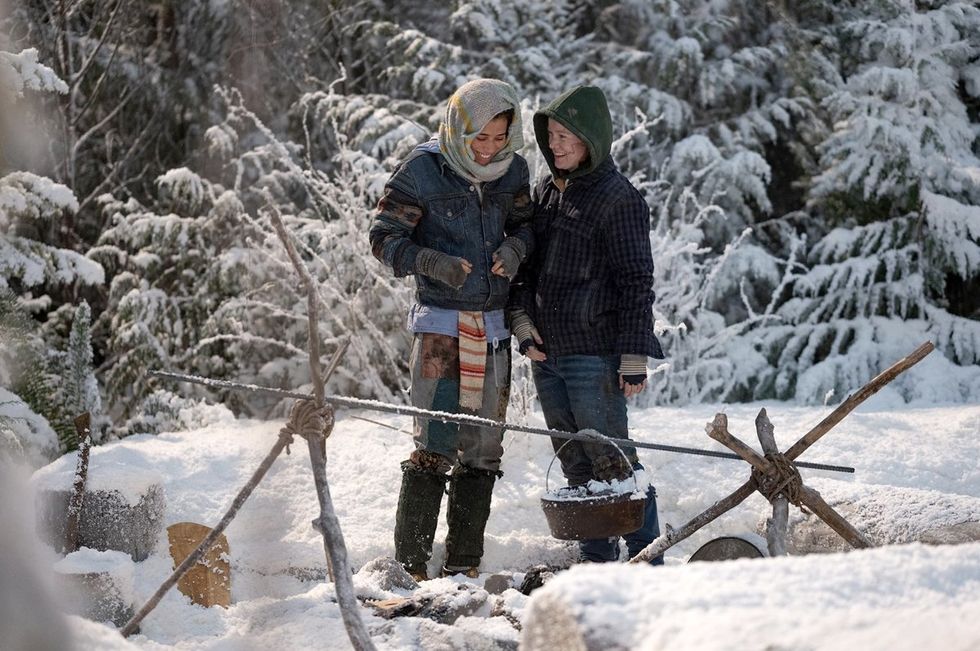
Combining genres of horror, thriller, drama, and comedy, the critically acclaimed Showtime series Yellowjackets tells the tale of a group of teen girls who, while traveling to compete in the national soccer championships, crash deep in the wilderness of Ontario, Canada. As the story unfolds, Yellowjackets smartly splits its narrative into two eras — 1996, when the crash occurred, and 2021, where it follows the survivors’ adult counterparts still haunted by what happened in the wilderness and deeply connected by shared secrets.
While things swiftly venture into Lord of the Flies territory, the series also features a touching love story between two of the girls, Taissa and Vanessa, played by queer actors Jasmin Savoy Brown and Liv Hewson. In addition to featuring multiple LGBTQ+ characters, the series also successfully flips the patriarchy on its head, with the teen girls outnumbering, outsmarting — and scaring the crap out of — the few males left among them. The star-studded, largely female-led cast features Melanie Lynskey, and Christina Ricci in Emmy-nominated roles while the younger cast shines as their teenage selves struggling to survive and stay sane against impossible odds. The highly anticipated third season of Yellowjackets, delayed by the 2023 actors’ and writers’ strikes, is set to premiere on February 14, 2025.
18. White Lotus (2022)
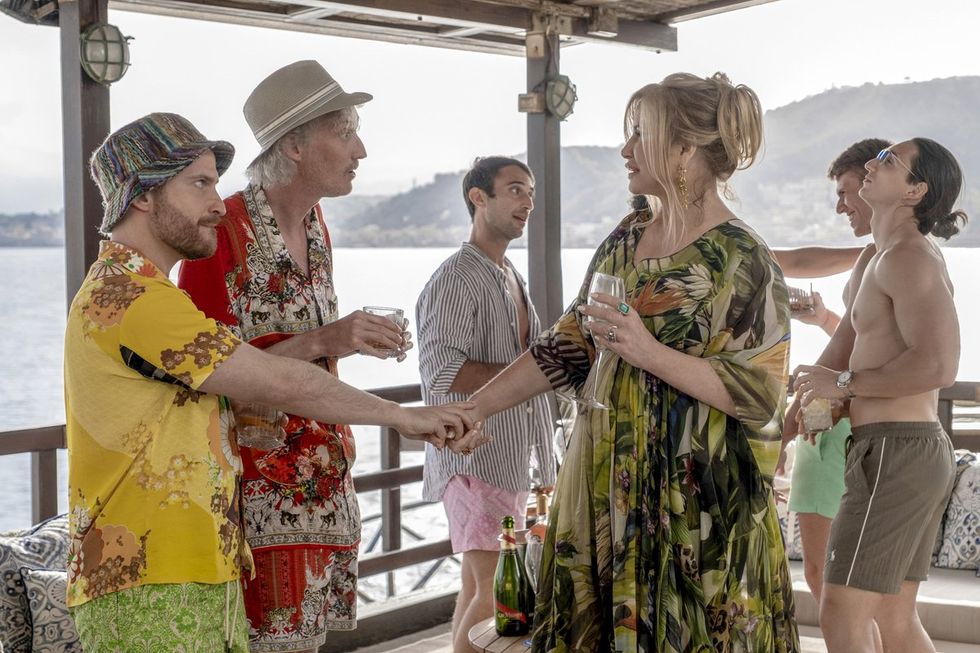
After years of pitching ideas to networks, studios, and streaming services, bicon Mike White finally found a home for the first season of The White Lotus on HBO: a show centered on ultra-wealthy (or rich by association) characters going on paradisiacal vacations to unleash their privileged demons on one another — literally and figuratively — as well as on the staff members working at the White Lotus resorts around the world. Somehow, the cast of unlikeable and spoiled freaks are fun and chaotic characters worth keeping up with and even rooting for.
The queer impact of The White Lotus is both flamboyant and overstated. The show has an undeniable queer sense of humor injected in a cast of beautiful and beloved actors playing these crazy rich monsters that audiences can't take their eyes off of. While the general vibe and comedy in The White Lotus is summed up in Jennifer Coolidge's iconic season 2 line, "These gays, they're trying to murder me," the series has been a fabulous fountain of indulgence while tackling universal themes like love, family, sex, and power. – BS
17. Somebody Somewhere (2020)

Smalltown queerness finally gets its due in this heartfelt show from HBO starring Bridget Everett, Jeff Hiller, and Murray Hill. The comedy-drama, created by Hannah Bos and Paul Thureen and inspired by Everett’s life, continues to receive acclaim for its authentic depictions of its characters. Somebody Somewhere takes place in rural Manhattan, Kan., and follows Everett’s character, Sam, as she returns to her hometown. Currently, in its final season, Somebody Somewhere gives queer storylines beautiful detail and attention and highlights the importance of found or chosen family.
16. Broad City (2014)
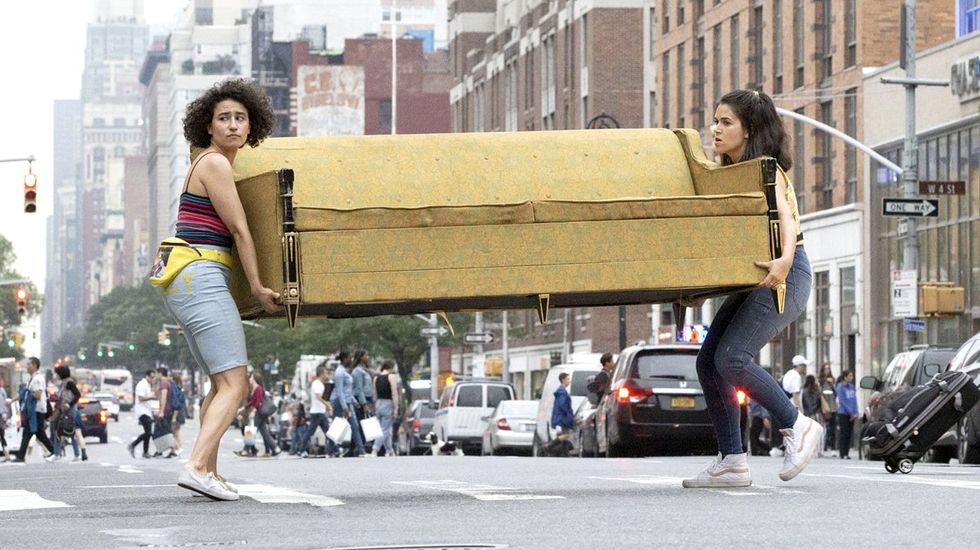
Not only is Broad City feminist and queer in its DNA, it's one of the great comedies of the 21st century. The Comedy Central series about weed-smoking, sex-positive best friends Abbi (Abbi Jacobson) and Ilana (Ilana Glazer) navigating life in New York City was hailed as an Absolutely Fabulous for a new, decidedly less moneyed generation. What began as a humble web series got a boost of female solidarity when Amy Poehler signed on to help executive-produce the show, which ran on TV for five seasons, 2014-2019.
At the time the series premiered, it was rare to see a lead bisexual character, but Glazer's Ilana affirmed her sexuality early on in the show's run and she continually celebrated her sexual identity with verve. Before the series ended, Abbi the character and Jacobson both came out as bisexual. The series also included Ilana's gay weed-loving roommate, Jaime (Arturo Castro), and her gay brother, Eliot (played by Glazer's actual brother Eliot Glazer).
Between wild antics that included Ilana risking shock by ignoring her shellfish allergy on her birthday, Abbi channeling her Judy Garland-esque alter ego Val, various drug-induced revelations, and celebrating the art of pegging, along with a chronicle of several relationships, abiding friendship between women was always at Broad City's core. — TEG
15. Transparent (2014)

Transparent, Jill Soloway's series about an elder transgender woman's coming out to her family, was a favorite of awards season that put Amazon Studios on the map. While Tambor's casting is an unfortunate mark on the show's legacy -- the actor is cisgender and he was accused of sexual harassment -- there is no denying the impact of the series, which was the first major TV show to put a trans storyline front and center.
The impact is also occupational. Dozens of trans people have worked on the show through its run, in front of and behind the camera, among them Alexandra Billings, Trace Lysette, Ian Harvie, Hari Nef, Zackary Drucker, Our Lady J, and Rhys Ernst. They will undoubtedly influence Hollywood for years to come. The show -- particularly in its early seasons -- was also remarkable in its exploration of Jewish identity through the lens of the Pfefferman clan, employing magical realism to demonstrate how historical trauma, such as the horrors of Nazi Germany, can impact generations to come. – DR
14. Noah's Arc (2005)
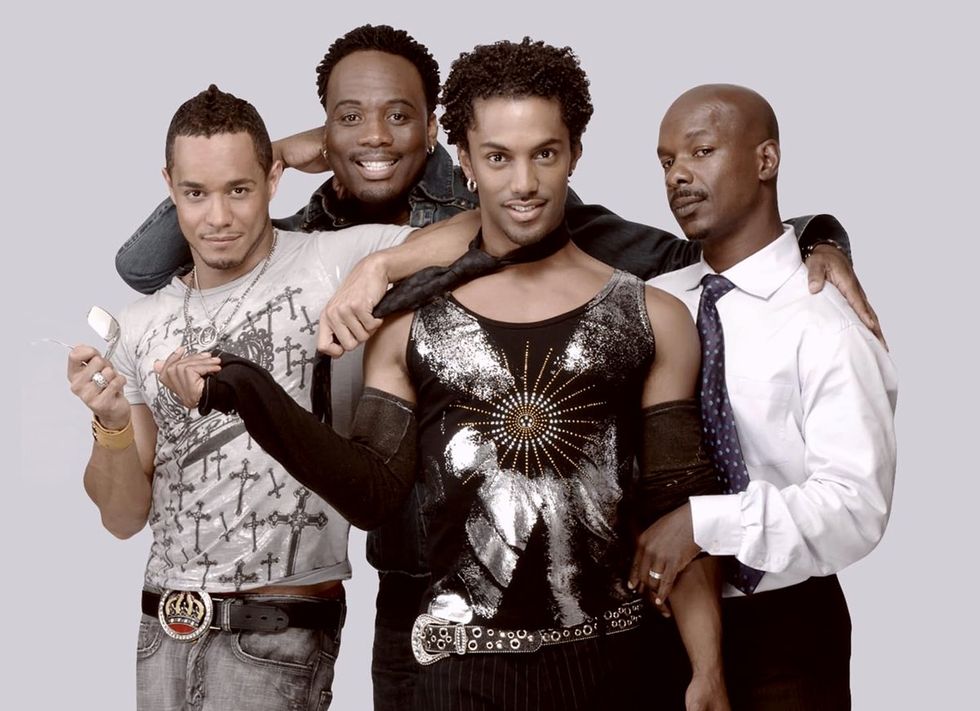
A comedy-drama that aired for two seasons on Logo between 2005 and 2006, the show made history as the first scripted TV series to feature a group of black gay characters. Noah’s Arc, created by Patrik-Ian Polk, explored Black queerness in a way never before seen in media. The characters Noah, Alex, Ricky, and Chance, gave a very gay alternate version of Sex and the City. It also featured conversations on the masculine roles men have to assume, marriage equality, and also on dating with HIV. A movie based on the series came out in 2008. Since then, the show’s return has been hinted at several times.
13. Baby Reindeer (2024)
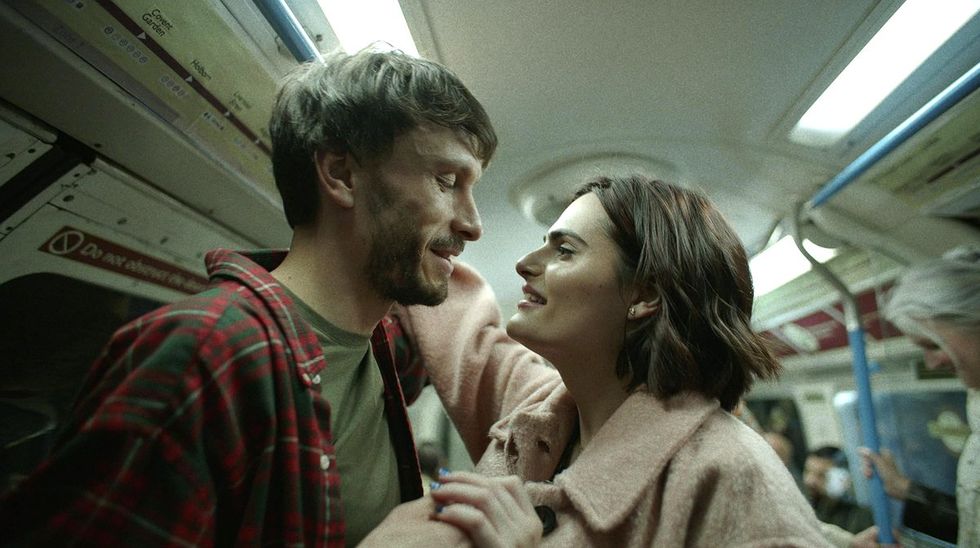
Baby Reindeer begins as a twisted dark comedy about comedian Donny Dunn (based on creator and star Richard Gadd) who develops an odd relationship with a lonely customer named Martha at the bar where he works. But as the relationship gets more skewed as Martha becomes his biggest fan, the show gets much darker. It delves into topics of sexual assault, power imbalances, and sexuality. Gadd tore open his chest and exposed his beating heart in this show, which takes a rare, and open, look at how trauma can impact sexuality. It features powerhouse performances by each of its three leads (all queer): Gadd, Jessica Gunning as Martha, and Nava Mau as Teri, Donny's transgender girlfriend. All three were nominated for Emmys, with the show winning six of the awards. – MR
12. A League of Their Own (2022)
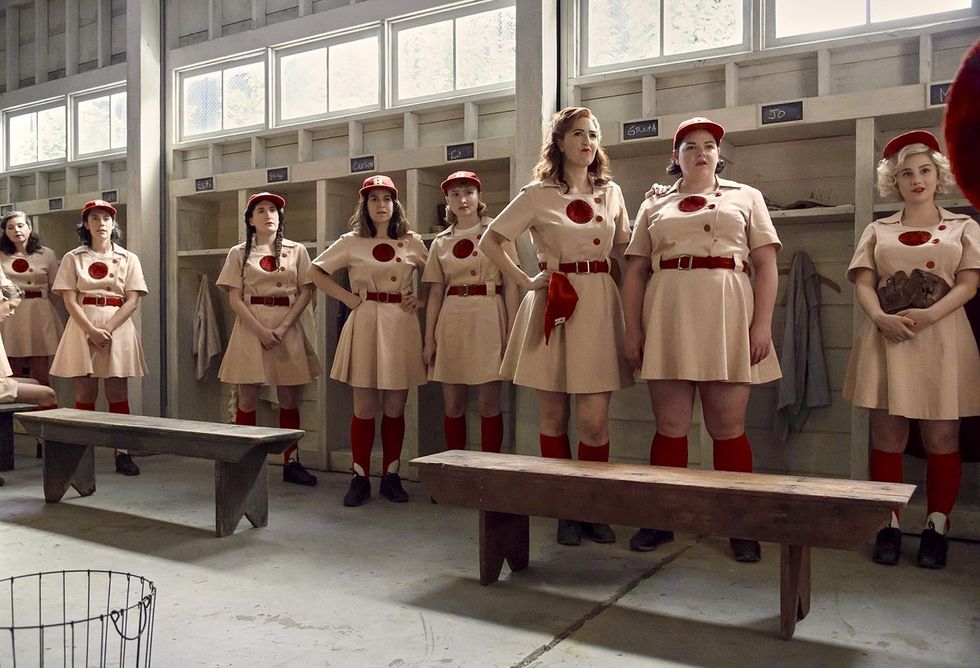
Created by Abbi Jacobson and Will Graham, A League of Their Own might just be the best lesbian TV show ever made. Also starring Jacobson, the show focuses on a group of women playing for the Rockford Peaches of the All-American Girls Professional Baseball League in 1943. However, unlike the classic 1992 film, and very much like real life, most of these players are gay as hell. Also unlike most shows that feature queer women, A League of Their Own told the stories of all kinds of lesbians: Black, white, Latina, butch, femme, married, old, young, fat, athletic, complicated, and problematic, and everything in between. It was unjustly canceled after just one season, so unfortunately, we'll never know where these incredible characters end up, but we'll always have these eight episodes to remind us that queer women have always, and will always, be here. – MR
11. Euphoria (2019)
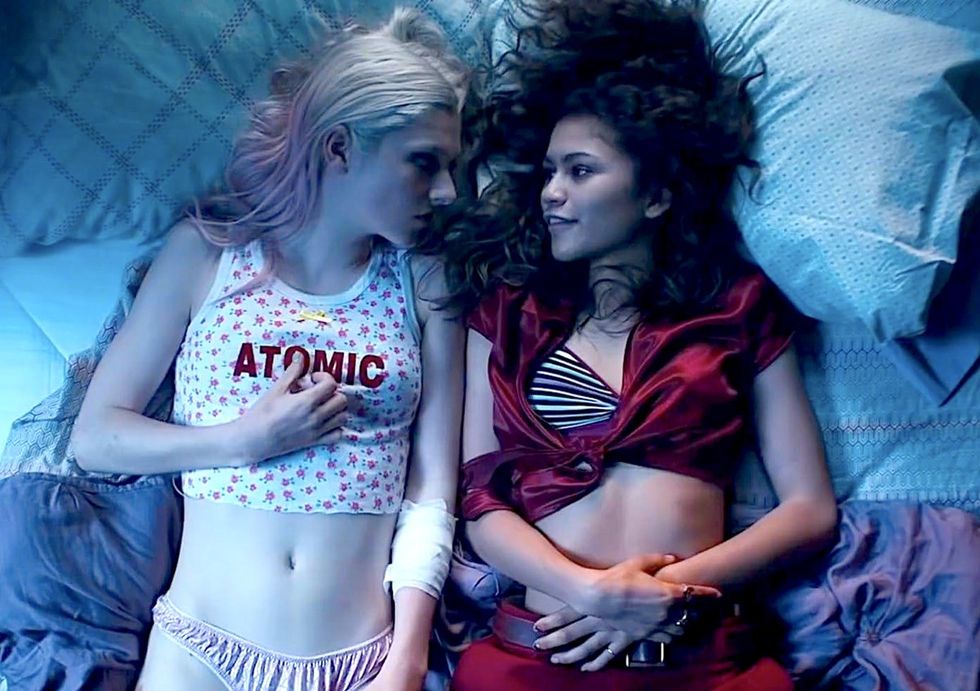
The gargantuan success of Euphoria turned its showrunner, Sam Levinson, into the poster child of a new era for HBO. It inspired an entire cycle of makeup artistry based on the aesthetic of the series; established queer and trans characters as protagonists; and elevated the careers of basically every single cast member in the series including Zendaya, Hunter Schafer ,Jacob Elordi, Sydney Sweeney, Barbie Ferreira, Colman Domingo, Storm Reid, Maude Apatow, Dominic Fike, and the late Angus Cloud.
Though Euphoria initially came off as a shock to the system for viewers who couldn't believe that high schoolers were partying harder than college students, the series was a watershed moment for LGBTQ+ representation. The love story between Rue (Zendaya) and Jules (Schafer) shattered various glass ceilings at once, proving that queer and/or trans characters not only deserved to be included in big-budget projects but could carry a juggernaut as massive as Euphoria. And just like that, Zendaya won the Primetime Emmy Award for Outstanding Lead Actress in a Drama Series, and several of her costars became lead actors in huge projects on the big screen like Elordi in Saltburn and Sweeney in Immaculate and Anyone But You. – BS
10. Queer As Folk (2000)
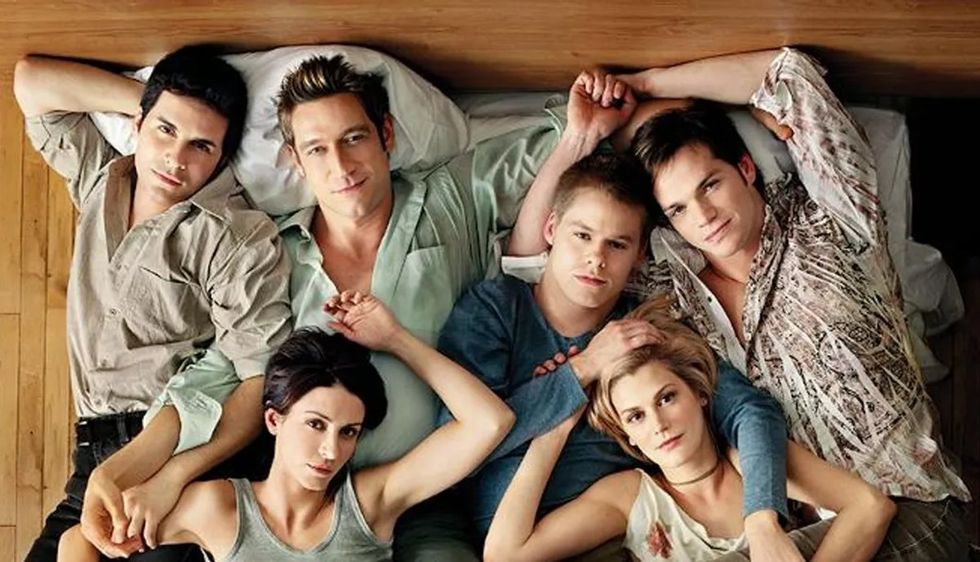
Queer as Folk, which premiered on Showtime in 2000, was adapted from a British series and became the first American television drama centered entirely on LGBTQ+ characters. Set in Pittsburgh, it followed the lives, relationships, and friendships of a group of gay men and lesbians. The show’s storylines addressed issues such as HIV and AIDS, discrimination, coming out, and family acceptance, with an unfiltered approach that was groundbreaking for its time. Across five seasons, Queer as Folk provided representation during an era when LGBTQ+ characters were less common on U.S. television. Its frank depictions of sexuality, love, and community resonated with viewers who saw their realities reflected on screen. Among its cast were out actors Peter Paige, Randy Harrison, and Robert Gant. As it ended in 2005, the series had helped expand possibilities for queer narratives in mainstream media. – Christopher Wiggins
9. Looking (2014)
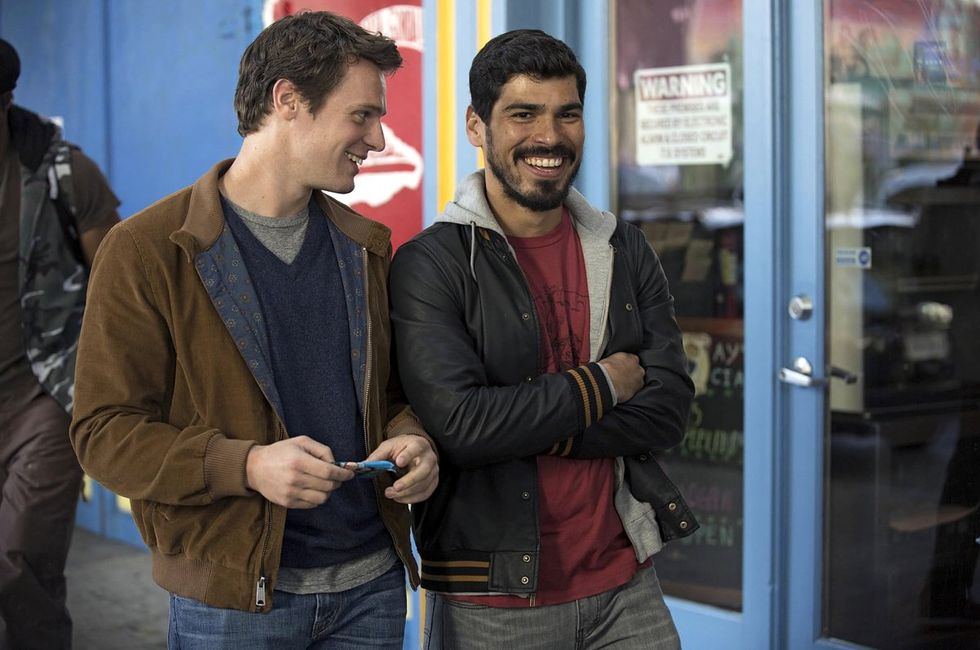
The often overused "ahead of its time" qualifier applies to Looking. After the success of Girls — deemed as a millennial successor to Sex and the City within HBO's programming — Looking felt like the perfect queer companion for the network. Centered on a group of queer men living in modern-day San Francisco, the series was created by Michael Lannan (Interior. Leather Bar.) and helmed by director/cowriter Andrew Haigh. Unfortunately, Looking was quickly dismissed by regular HBO audiences, and also failed to attract queer viewers to the premium cable network.
Haigh's has created an acclaimed visual language that made its first splash in the well-reviewed film Weekend (2011) and had an even more ambitious polish in the awards contender All of Us Strangers (2023). Though Looking failed to gain a massive audience in its time, it did wrap up its story with a movie and has gone on to be retroactively appreciated. The series showcased Jonathan Groff's star power and featured Murray Bartlett, Raúl Castillo, Russell Tovey, and Frankie J. Alvarez. – BS
8. Modern Family (2009)

Modern Family didn’t just redefine the sitcom; it gave it a much-needed glow-up for the 21st century. Premiering in 2009, the series follows the chaotic, loving, and utterly relatable Pritchett-Dunphy-Tucker clan through 11 seasons of laugh-out-loud moments and heartfelt lessons. With its mockumentary format, it felt fresh and modern—like eavesdropping on the quirkiest family you never knew you wanted to join.
What really set Modern Family apart was its willingness to embrace the messiness of real life. From Mitchell (Jesse Tyler Ferguson) and Cameron (Eric Stonestreet) breaking ground as a gay couple navigating parenthood, to Gloria (Sofia Vergara) unapologetically smashing stereotypes in an age-gapped relationship, the show was as much about representation as it was about family dynamics.
The cast brought razor-sharp writing to life. The result? Five consecutive Emmys for Outstanding Comedy Series and a legacy as TV’s ultimate family portrait: funny, flawed, and full of heart. It reminded us that family, however unconventional, is worth celebrating. — Christopher Wiggins
7. Hacks (2021)
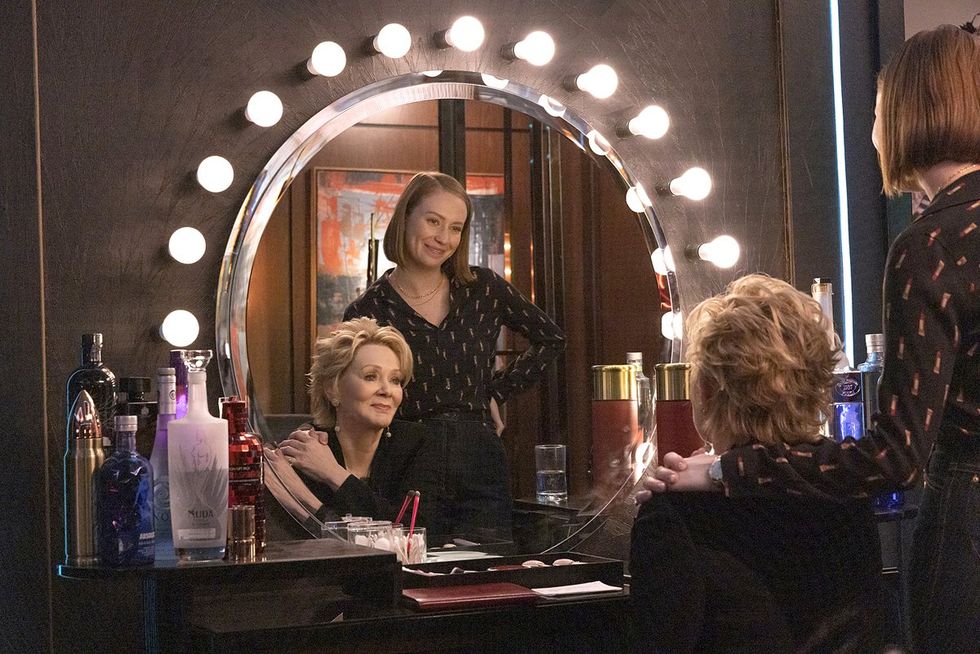
Hacks might as well be called Mommy Issues: The Show. It stars Jean Smart as Deborah Vance, a legendary stand-up comedian who brings on a young bisexual writer Ava Daniels (Hannah Einbinder) to help freshen up her act. The two soon develop a stronger bond than boss/employee while dealing with huge new opportunities and challenges. Apart from the intensely psychosexual homoerotic relationship crackling between the stars, the show also features Ava's love life, Deborah's queer COO Marcus, her queer personal assistant Damien, and gives all of them space to be their own characters with their own lives. Oh, and it's one of the funniest and best-written shows on TV. – MR
6. Fellow Travelers (2023)
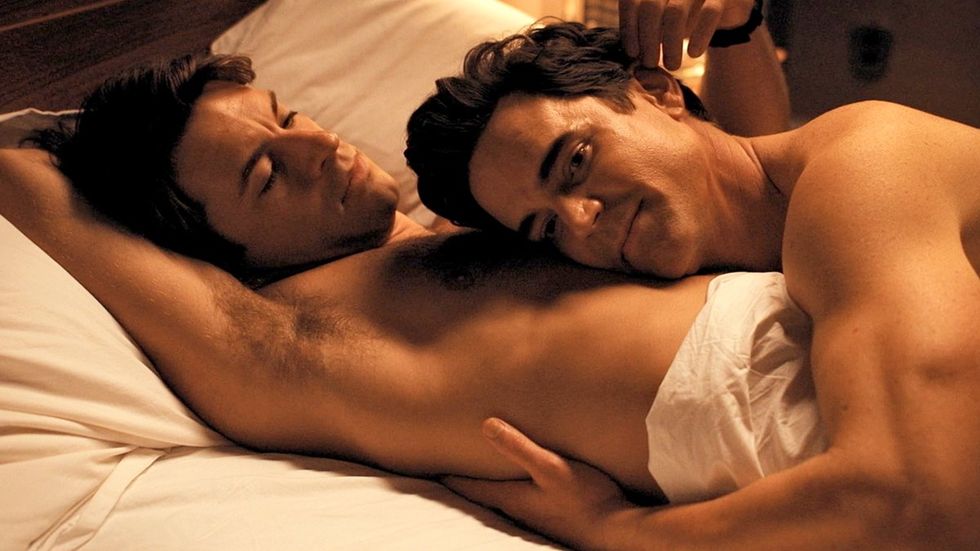
Matt Bomer, Jonathan Bailey, Jelani Alladin, and Noah J. Ricketts brought gay American history to life in this Showtime series following two men, Hawkins Fuller and Timothy Laughlin, who meet and fall in love working in 1950's Washington, D.C. starting during the Lavender Scare and going through the Vietnam War, the drugs and decadence of the 70s, and the AIDS crisis of the 1980s. Few shows have portrayed gay American history so boldly, and even fewer have done it so well. Fellow Travelers manages to pack a huge emotional punch, lay bare truths about some of the darkest periods of American History, and still have some of the hottest gay sex scenes you'll ever see on television. – MR
5. Glee (2009)
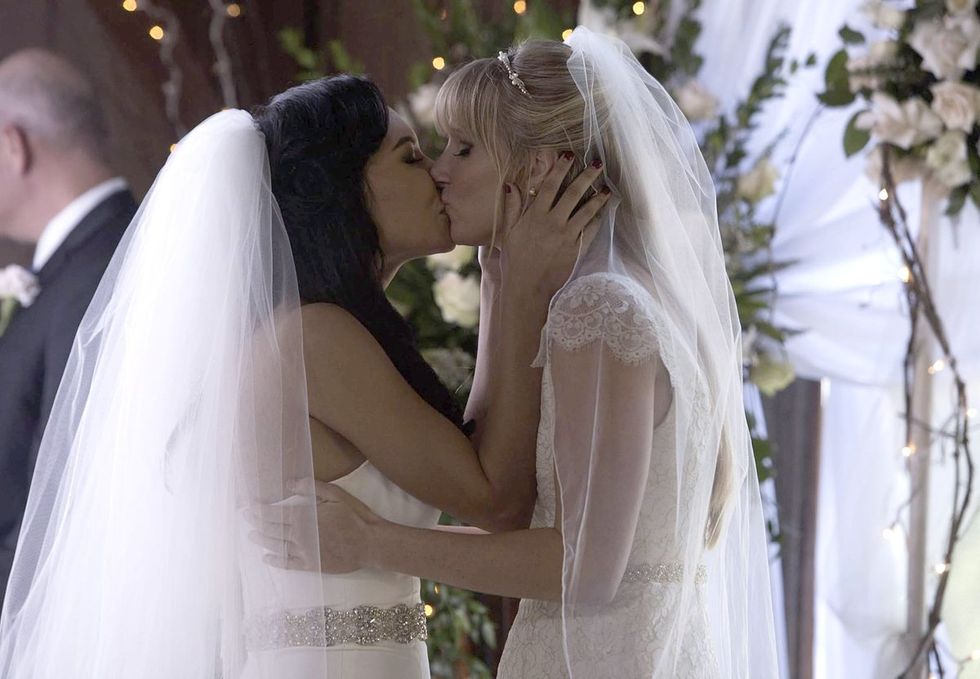
For those who weren't around during its heyday, it's hard to describe just how impactful and ubiquitous Glee was. Ryan Murphy's dramedy about a misfit group of students at William McKinley High in Lima, Ohio, forming a glee club and learning to embrace their true selves won six Emmys and four Golden Globes, and the cast was the first artist with 200 songs chart on the Billboard Hot 100. In 2010 alone, the Glee cast had 80 songs chart on the Hot 100, still the most for any artist in one year. Among its main cast, Glee had several queer students, including Kurt Hummel, Santana Lopez, Blaine Anderson, Brittany S. Pierce, and Unique Adams. The series included several queer actors as well including Chris Colfer (Kurt), Jane Lynch as Coach Sylvester, and Dot Marie Jones as Coach Sheldon Beiste. Kevin McHale, who played Artie, came out in 2015. Few shows centered the lives and issues of queer teens like Glee did, and even fewer shows have had as gay a sensibility as this comedy about show tunes, stardom, and love of Barbra Streisand. – MR
4. The L Word (2004)
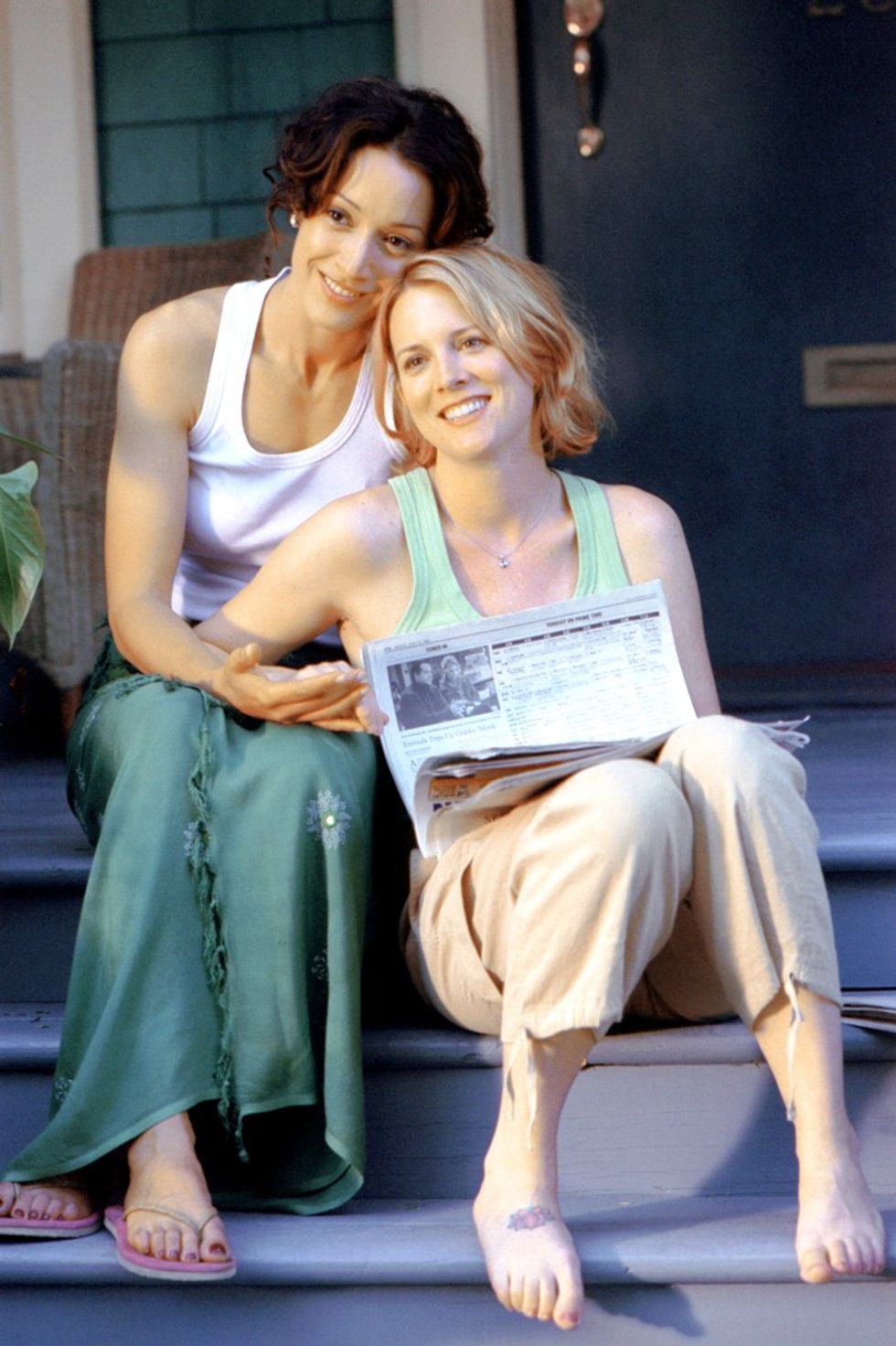
Lesbians written and directed by queer women on screen began to get their due in the 90s with films like Go Fish, The Watermelon Woman, and The Incredibly True Adventures of Two Girls in Love. By the early aughts, TV still lagged in telling stories by and about Sapphics until 2004 when The L Word premiered. The series, about a group of West Hollywood Sapphics from lesbian creator Ilene Chaiken, brought queer women into our homes on Showtime. Sapphics regularly gathered around the TV to watch and debate the characters they were most attracted to — Bette for some, Shane for others, and so on. For six seasons, the denizens of The Planet were on our televisions “Fighting, f*cking, crying, drinking.” There was hot sex, bad sex, weddings, deaths, divorces, bad haircuts, and questionable fashion choices, and it all became a part of the lesbian cultural record. Its reboot, The L Word: Generation Q, ran for three seasons beginning in 2020.– TEG
3. Orange is the New Black (2013)
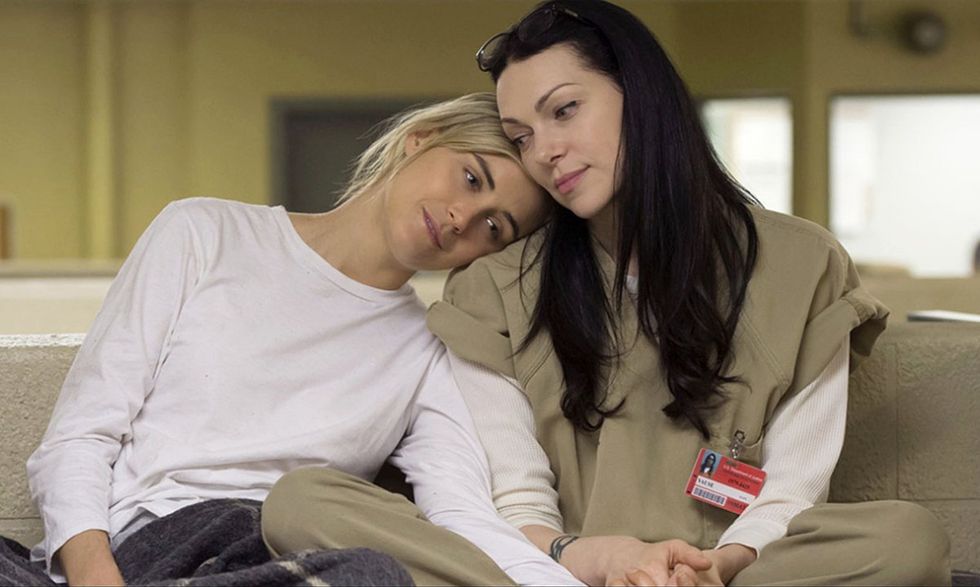
When Netflix dropped Orange Is the New Black's first season in the summer of 2013, it changed TV forever. It was one of the first truly binge-able shows to air on streaming -- literally altering the way viewers consumed content. But more than its power to render enthralled fans helpless to turn away for hours when a new season was released, it excavated the intersections of issues facing women of color, lesbians, bisexuals, and trans women. It took on tough issues around classism, white privilege, sexual violence, addiction, police brutality, and the prison industrial complex. And it managed to do it all while remaining funny and without being preachy.
The landmark series from creator Jenji Kohan (Weeds, Glow), based on Piper Kerman's memoir, deployed lead character Piper (Taylor Schilling) -- a bisexual white woman happily enjoying her upper-class suburban advantages until she's remanded to prison for running drugs for her ex-girlfriend 10 years prior -- as a Trojan Horse. Via Piper, the series explored an anthology of stories about a cross-section of diverse women. For her work as Sofia Burset on OITNB, Laverne Cox became the first transgender woman to be nominated for an Emmy award.
OITNB filled a void for queer women after The L Word ended in 2009, and it helped pave the way for intersectional LGBTQ+ shows like Pose and Vida. – TEG
2. Schitt's Creek (2015)
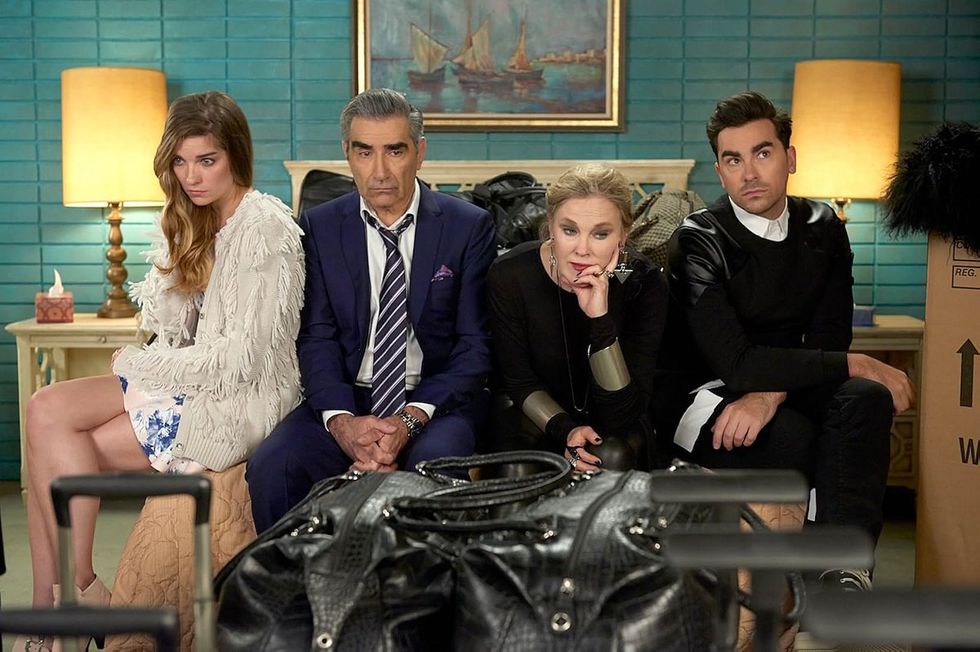
Premiering in 2015, Schitt’s Creek followed the wealthy Rose family as they adjusted to life in a small town after losing their fortune. Created by Eugene Levy and Dan Levy, the comedy series gained a dedicated following for its character development and heartfelt humor. It featured an openly pansexual character, David Rose (Dan Levy), who formed a loving relationship with Patrick Brewer (Noah Reid). Viewers embraced the show’s portrayal of queer romance without conflict or prejudice. Over its six-season run, Schitt’s Creek earned numerous awards, culminating in an Emmy sweep in 2020 that included Outstanding Comedy Series. The show’s popularity soared on streaming platforms, introducing its inclusive storytelling to global audiences. By the time it ended in April 2020, Schitt’s Creek had established itself as an example of LGBTQ+ characters thriving in positive, supportive environments. Without relying on sensationalized drama, it presented queer joy as a natural part of everyday life, resonating deeply with viewers seeking affirming, authentic narratives. And who can forget the campiness of matriarch Moira's (Catherine O'Hara) Wig Wall or the lyrics of "A Little Bit Alexis" (Annie Murphy's socialite sister Alexis). Queer actor Emily Hampshire also added to the shenanigans as the sardonic Stevie.– CW
1. Pose
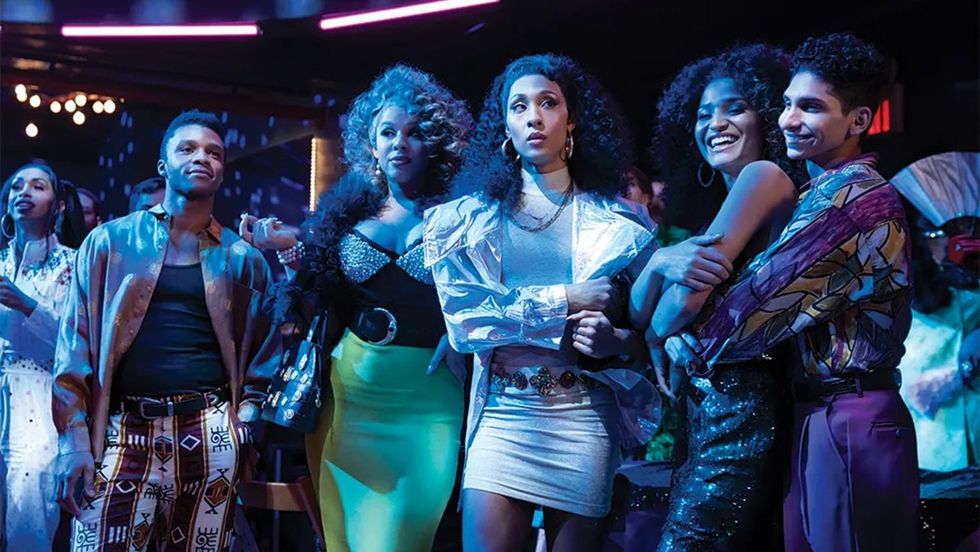
Premiering in 2018, Pose sashayed onto our screens and into our hearts, immersing us in all the drama, glamour, heartbreak, and hope of New York City’s late-80s ballroom scene.
With Michaela Jae Rodriguez serving face and Billy Porter dropping wisdom as Pray Tell, this show was a masterclass in how Black and Brown queer and trans folks find chosen family and resilience. Each serve and strut was also a reminder that sometimes, you need to build your own spotlight to truly feel seen.
Pose was about love. Love in the face of crisis, love that rebuilds, and love that refuses to be erased. By breaking barriers for queer and trans individuals in front and behind the camera during the show’s run, Pose didn’t just tell stories–it made history, with Rodriguez becoming the first transgender actor to win a Golden Globe Award.
Life’s a ballroom, and Pose is a fierce reminder that it’s not just about the walk but the world you create with each step. – Marie-Adélina de la Ferrière
